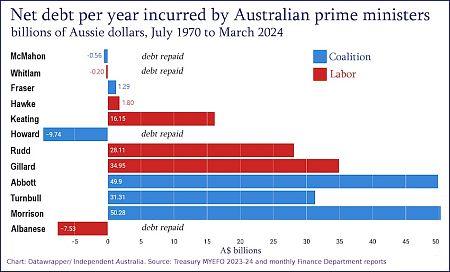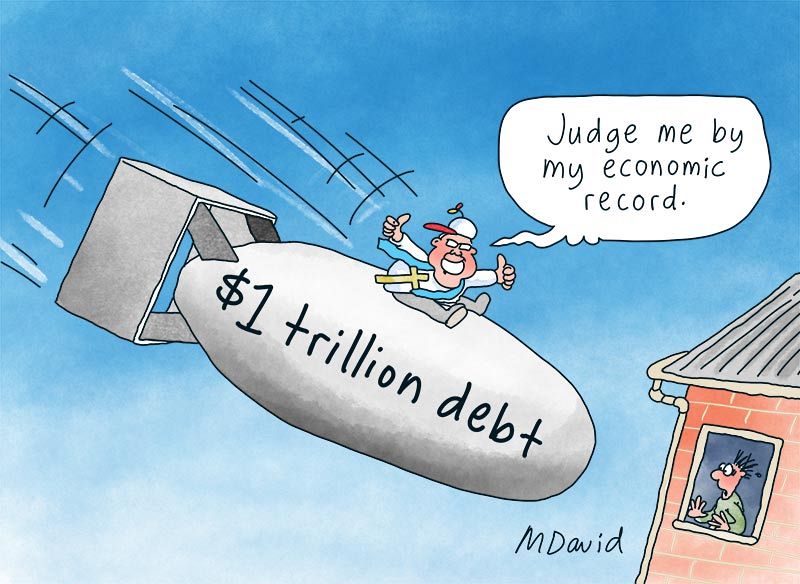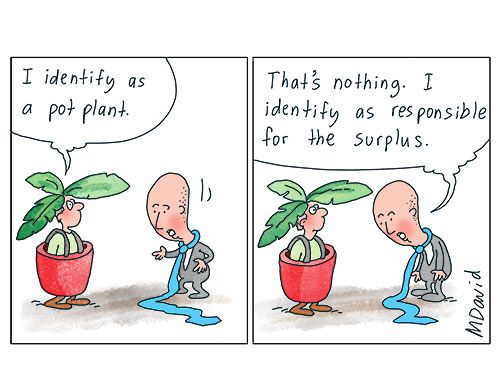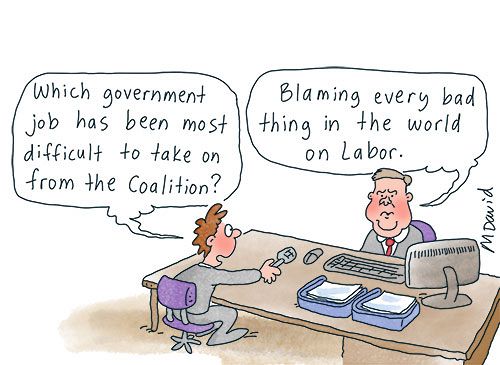The latest debt figures prove the stark differences between Australia’s political parties. Alan Austin reports.
*Also listen to the audio version of this article on Spotify HERE.
TOMORROW’S FEDERAL Budget documents should reveal a small increase in gross debt this financial year but a significant reduction in net debt. They are also expected to show another healthy surplus and portend more to come.
Most importantly, the historical data will condemn comprehensively the gross mismanagement of the recently departed Coalition.
The chances of this being reported accurately by the mainstream media are zero multiplied by the gross national product.
We know from last December’s Mid-Year Economic and Fiscal Outlook and subsequent monthly Finance Department reports that Labor has turned the Budget around swiftly. It has now reduced net debt for two years running, for the first time since Wayne Swan was Treasurer in 2008.
Anthony Albanese now joins William McMahon, Gough Whitlam and John Howard as the post-war prime ministers who have reduced net debt through their tenure.

The disastrous Abbott years
In August 2013, Treasury and the Finance Department published their Pre-Election Economic and Fiscal Outlook. This showed that with Labor’s Budget parameters and prevailing conditions, a deficit of $24 billion would be achieved by June 2015, a smaller deficit of $4.7 billion by June 2016, a modest surplus of $4.2 billion in June 2017 and strong surpluses thereafter.
Hence, the accumulated deficits for those three years would have been $24.5 billion – absent any setting changes – and that would be repaid two or three years later.
The Coalition did change the settings. It allowed unconscionable waste, rorts and tax evasion and delivered deficits of $37.9 billion in 2015, $39.6 billion in 2016 and $33.2 billion in 2017. So, instead of an extra $24.5 billion, it borrowed $110.6 billion.
It repaid none of it. Just extraordinarily destructive.
The Morrison misfortune
Overall outcomes soon proved that former PM Tony Abbott and Treasurer Joe Hockey were Australia’s least competent economic managers — up to that time. So, a coup was swiftly implemented after just two years.
To the astonishment of observers, incoming Treasurer Scott Morrison proved even less capable than Joe Hockey. He continued to generate deficits at a time when every well-managed economy was yielding strong surpluses and repaying borrowings needed during the Global Financial Crisis.
Seeing Morrison fail abjectly to manage the economy, the Liberal Party promoted him to PM and engaged the hapless Josh Frydenberg as Treasurer.
The pattern continued. Frydenberg was even worse than Morrison. The Coalition’s all-time worst economic outcomes reached 60 in March 2022.
Frydenberg’s first Budget in 2019 forecasted surpluses over the following three years totalling $35.9 billion. That would have reduced the debt by that amount. About time. Instead, Frydenberg generated deficits in each of those years, totalling a staggering $251.4 billion.
COVID-19 responses
A deficit in 2019-20 of about $40 billion, which was 2% of the gross domestic product (GDP), was justified to deal with the pandemic. Another deficit was arguably reasonable in 2020-21. That’s based on experience in comparable countries.
Deficits in the Netherlands, Taiwan, Saudi Arabia, Estonia and Poland were below 2.5% of GDP in 2021. New Zealand, Ireland, Sweden and Switzerland had deficits below 1.5% that year.
Denmark, Norway, Luxembourg, Lithuania and the United Arab Emirates all generated surpluses.
Monumental Coalition failure
Hence, there was no excuse for the Liberal and National Parties to have left any net debt at all after enjoying buoyant global conditions for almost all of their eight years and eight months.
Except for two quarters during the pandemic, Australia’s quarterly economic growth remained positive throughout — the only other G20 nations to achieve that were China, India and the United Kingdom.
Inflation through that period remained within the optimum band of 1% to 3.2%. Australia was the only G20 economy with that advantage.
Iron ore prices remained strong, seldom falling below US$50 (AU$75) per ton and frequently surging above US$80 (AU$120). Australian thermal coal also fetched better than US$50 (AU$75) for most of the Coalition years, climbing above US$100 (AU$150) in 2017 and 2018. Prices of most other commodities were favourable.
Australia’s total export values increased strongly, rising from $263 billion in calendar 2013 to $457.1 billion in 2021.
Clearly, Australia was extraordinarily well-placed to deliver hefty surpluses every year of the Coalition’s term – except 2020 – and to have eliminated entirely the puny $161.3 billion net debt it inherited in 2013. Instead, the Coalition had blown it out to $541 billion by the 2022 Election.
Gross debt – on which interest is payable – soared from $271.7 billion in 2013 to a staggering $888.5 billion.
Role of the media
As Coalition deficits deepened, debt surged and interest costs skyrocketed, the craven mainstream media maintained a conniving silence.
The raucous screams of "Gillard's debt disaster", "debt spiralling out of control", "Budget emergency" and "terrible economic mismanagement" throughout the Labor period totally ceased — despite manifestly worse outcomes.
Labor’s achievements
The Albanese Government has shown what sensible decision-making can deliver in tough times. It has generated two surpluses already despite the challenges of a war in Europe, China in decline, turmoil in the USA, half the Organisation for Economic Co-operation and Development (OECD) in recession or teetering on the brink, persistent inflation and the vast Morrison debt — none of which confronted the last mob.
Treasurer Jim Chalmers last Friday stated that:
“Economic management is paying down debt and making room to help with cost of living and invest in the future.”
Tomorrow’s Budget documents will bolster that.
The far more urgent message is this — never let the Coalition anywhere near the levers of power again while it retains any of the incompetent fools who tried to run the country last time. And while it clings to its disastrous policies of pandering to the rich — allowing rampant tax evasion and squandering the nation’s wealth.
*This article is also available on audio here:
Alan Austin is an Independent Australia columnist and freelance journalist. You can follow him on Twitter @alanaustin001.
Related Articles
- The Budget Circus is coming to town
- Australia's fiscal health under Labor reaffirmed in latest IMF rankings
- Despite media frenzy, Labor continues to lead economic metrics worldwide
- CARTOONS: There's a jingle in Mark David's pockets!
- Budget aims to fix Dutton's migration policy disasters
 This work is licensed under a Creative Commons Attribution-NonCommercial-NoDerivs 3.0 Australia License
This work is licensed under a Creative Commons Attribution-NonCommercial-NoDerivs 3.0 Australia License
Support independent journalism Subscribe to IA.















